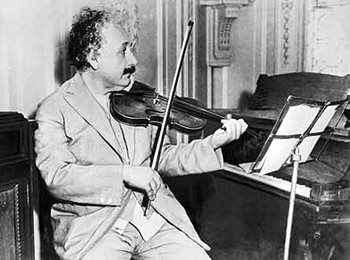Genius Continues to Inspire Classrooms
Anna Beth Gruber |
April 26, 2017
Last night Genius premiered on the National Geographic channel. The new mini-series explores Albert Einstein’s life beyond his academic work. This series is a reminder of not only the man Einstein was, but also the lingering impact his work has today, including his influence on how students approach their classroom work.
 Einstein was very much an advocate of creative thinking and the ways that philosophy could be applied to science. In fact, many believe that his musical hobbies served as an example of his belief that insight did not come solely from logic or mathematics, but instead found roots in intuition and inspiration.
Einstein was very much an advocate of creative thinking and the ways that philosophy could be applied to science. In fact, many believe that his musical hobbies served as an example of his belief that insight did not come solely from logic or mathematics, but instead found roots in intuition and inspiration.
Einstein first described his intuitive thought processes at a physics conference in Kyoto in 1922, when he indicated that he used images to solve his problems and found words later. Einstein's autobiographical notes reflect this thought process: "I have no doubt that our thinking goes on for the most part without the use of symbols, and, furthermore, largely unconsciously." (Schilpp, pp. 8-9).
Above everything, Einstein consistently displayed an appreciation for intellectual exploration, stressing the importance of not just transferring knowledge, but also ensuring students can think for themselves outside of the classroom - a philosophy which NMSI also embraces. By participating in AP® courses, students are not merely being taught to memorize everything about a topic, but are pushed to develop critical thinking skills and to gain a sense of independence and confidence that they can apply outside of the classroom.
By providing our students with the tools to think outside of the box, we are not only preparing them to succeed in school, but also in their careers and life outside of school.
As Einstein said, “The development of general ability for independent thinking and judgement should always be placed foremost, not the acquisition of special knowledge. If a person masters the fundamentals of his subject and has learned to think and work independently, he will surely find his way and besides will better be able to adapt himself to progress and changes than the person whose training principally consists in the acquiring the detailed knowledge.”
How do you embrace Einstein’s creative-thinking philosophy in your classroom? Tell us on social media.